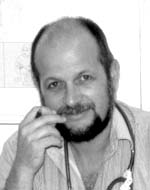Ben Aliza and Mordechai. Born on Valentine’s Day – Tu B’Av 5717 (12.8.1957) in Hadera, the eldest son of his parents. Zvika studied until the fourth grade at the Amishav Elementary School in Givat Olga. When he was 10 years old, he moved to Hadera with his parents, and Zvika began attending elementary school in Ahad Ha’am. In the fifth grade he joined the Scouts – an occupation that became central to his life during this period. Throughout his high school years, he continued to be active in the movement, as an apprentice and as a guide. In 1974, he went with the Scouts delegation to Nashville, Tennessee, to the United States. In 1975, Zvika completed his studies at the Hadera High School in the literary track. He chose to postpone his army service a year for a social cause, and volunteered for a core group that operated in Yeruham. During this year he trained and educated youth in the development town. Towards the end of 1976 Zvika enlisted in the army and served in the Engineering Corps. He underwent professional courses and served as a sabotage instructor in an officers’ course. After his release, Zvika began studying medicine at Ben Gurion University in Be’er Sheva. During his studies, he coordinated the Perach project at the university (a project aimed at assisting and mentoring children in distress) and worked as a nurse in the pediatric intensive care unit at Soroka Medical Center in Be’er Sheva. Zvika met Zivika in the Soroka Medical Center, where he worked as a family doctor in the Bedouin town of Rahat in 1990. His family moved to Haifa in 1990, and Zvika began his internship In Pediatrics at Carmel Hospital, where his second son, Eva, was born D. In 1994, Dr. Zvika Rosenwasser completed his residency in Pediatrics and moved with the family to Kibbutz Gilad. Zvika served as a doctor on the kibbutz, and at the same time worked as a pediatrician in the clinic in Atlit. In 1996, Zvika began working at the Rambam Medical Center in Haifa, in the pediatric cardiology department, where his third son, Elad, was born, and throughout his years as a physician, Dr. Rosenwasser received deep appreciation and sympathy from both his patients and his colleagues. “In every framework he managed to develop human relations and friendships with the staff and the patients, he stood out as a doctor and as a person,” wrote the director of the Carmel hospital administration. His love of his people, his honesty, and his quiet and pleasant manner aroused trust and admiration around him. “I will always remember Zvika as a model of a doctor who sees not only the disease but also the person behind it,” wrote his friend Yossi Krothamer, who served with him in the battalion’s reserve duty, and who saw him in his last moments. “I always think about Tzvika when I play Boaz Sharabi’s song Letat,” wrote his wife, Dr. Irit Rosenwasser-Hermesh. Giving and caring for the family were his primary concern. His tolerance and good relations with all those around him were also expressed in the friendships he created – within the framework of his work, in the reserves – with people who were different from him in terms of changing their opinions and status. Zvika did not flinch and did not move away. In his openness and pleasantness he knew how to maintain bad relations with others. In 1991, Zvika volunteered to serve in the reserves as a medical officer in a regiment of infantry in the Red Formation, and he set up a glorious battalion gathering station, created a skilled team of officers and invested much effort beyond that expected. As commander of the battalion, I found the need for his presence, in difficult moments, “his commander defined Zvika’s importance to the reservesThe battalion. On Sunday, August 17, 1997, Zvika went to reserve duty for the last time. The next day, on the day of Tu B’Av 5757 (18.8.1997), when he made his way to battalion training, Dr. Zvika Rozenwasser was killed in a car accident at the Hala intersection and was laid to rest in the military section of the old cemetery in Hadera. And his wife, Irit, 11, Ohad, 7.5, and Elad, 1.5, parents and a younger sister, Zippy, who was born on Valentine’s Day and was killed on Valentine’s Day. “I can not write about you,” his mother writes in his memory, “because you are with me. By. “At the Hala Junction, where the accident was located, a hand was placed in Zvika’s memory:” And he is modest and simple, like you in your life, and at the same time resistant to the ravages of time, as you do in our memory. “
